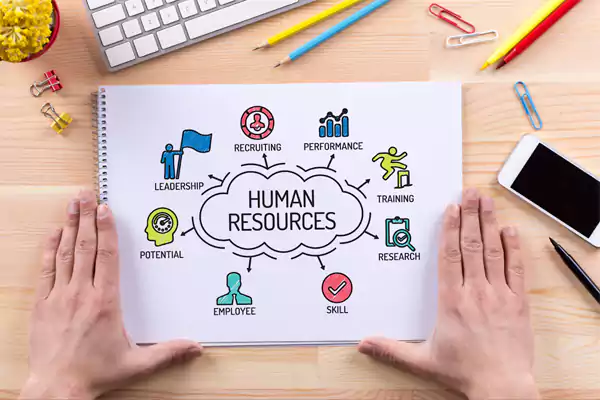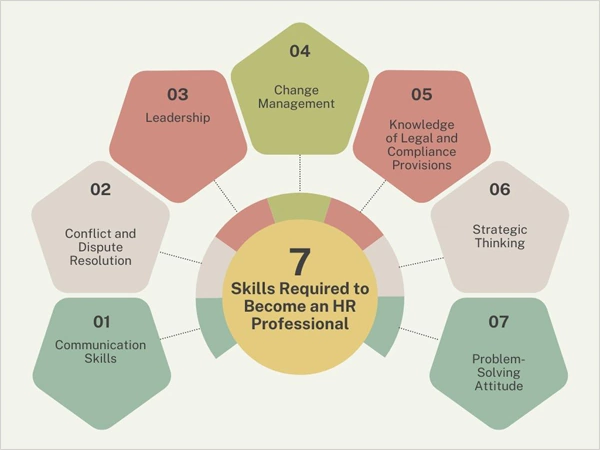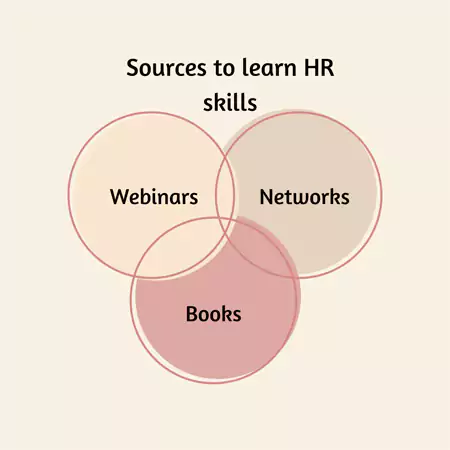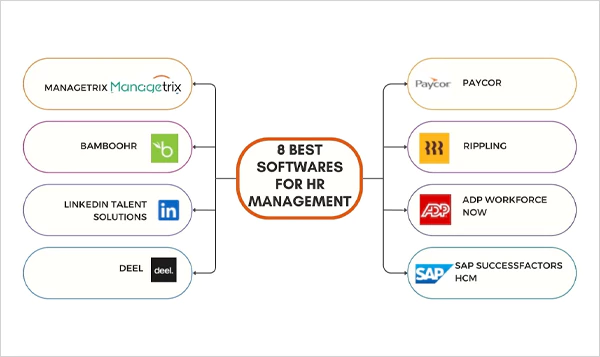A firm works as a systematic arrangement of different departments intricately woven through corporate aesthetics. All these departments work as cogs in a machine to drive collective growth.
However, the role of HR professionals in the company remains paramount. These professionals are responsible for cinching all subparts of a firm and making them work in harmony and sync.
But the most central question to all these is, what is the full form of HR in the company?
To expound on such doubts, here we have addressed all the core and peripheral aspects around this designation in the blog to understand its crux and deduce its essence.
What is the Full Form of HR in the Company?

The full form of HR in a company is Human Resources. This term was coined in the early 20th century to denote the people managing the workforce in a company. The Oxford dictionary defines it as “people’s skills and abilities, seen as something a company, an organization, etc. can make use of.”
In simple terms, the HR professional refers to a person responsible for recruiting employees, handling salaries, and streamlining the company operations. This makes the different departments the spokes and the HR department the hub of the entire firm.
Every company or organization, whether it is a startup or a giant firm, has an HR department that takes care of the business functioning and acts as a company resource to the employees.
To understand the full form of HR in a company, we need to understand its associated facets.
Prominent Types of HR Professionals
“Human Resources” is a broader field that offers multiple roles that manage different aspects of employee and organization development. Here are the primary types of HR:
- Strategic HR: These HR professionals connect human resource management with organizational objectives. It includes workforce planning, leadership training, and succession activities for guaranteed growth of the company. They collaborate with the leaders to make the company policies and promote them amongst the employees.
- Operational HR: Their job is to oversee the day-to-day activities of the company, employees, and leaders. The work pressure includes recruitment, employee relations, payroll, and benefits administration. They try to bring the employees and company policy on the same page to maintain workplace sanity.
- Employee Relations HR: This HR is heavily responsible for creating and building a healthy work culture at the company. Their job is to brainstorm and implement policies that work in favor of the employees. Plus, they introduce initiatives for a positive work environment.
- Talent Acquisition HR: These HR professionals are highly trained in searching and screening for the right candidate that aligns with the company’s goals. In simple words, they are responsible for understanding the needs of the company and finding talent with the desired skill sets. They post the job requirements, screen candidates, conduct interviews with higher authority, and handle the paperwork involved in the recruiting process.
- Compliance and Risk Management HR: Every company, whether it is service-based or product-based, is bound to follow labor laws. Compliance and risk management HR is responsible for conducting audits, handling employees’ paperwork, and adhering to company policies by strictly enforcing anti-discrimination and harassment rules.
These are the types of HR you will often find working in an organization.
From this, you might have got the idea about what is the full form of HR, roles, responsibilities, and requirements. We have explained everything about the HR post full form in the company in the forthcoming sections of this blog.
Functions of HR
Although the full form of HR itself depicts its multifunctionality, there are certain roles that a general HR professionals perform. These functions represent the pivotal position of this profession in the general operations of the firm.
- Recruitment: Recruiting the perfect talent for the required designation remains on the shoulders of the HR professional.
- Performance Analysis and Management: They examine the performance of the employees to make further decisions on their progress.
- Maintaining Work Culture: Such professionals remain involved in ensuring a cordial work culture and maintain corporate ethos.
- Training and Skill Development: Providing significant avenues for skill development is another crucial role of an HR professional.
- Grievance redressal: To arbitrate the disputes, neutralise the conflicts, hedge their impact on work culture, and expand capacity to cope with such situations is another function of HR.
- Employee Information Management: The data and information of the employees are managed and segregated in a meaningful manner by the HR department.
Now, let’s head to the major challenges faced by HR personnel while serving their duties.
Major Obstacles in the HR Profession in a Company
The HR job is not a monotonous profession, but it stands circumbient to diverse roles and responsibilities. This makes it highly prone to the challenges that you must be mindful of. These are as follows:
- Attracting and sustaining good talent in the firm.
- Adopting technological changes and percolating them to the other departments.
- Managing multiple laws and compliance to keep the firm statutorily upright.
- Administering training and Development opportunities to amplify the employees’ caliber.
- Ensuring increments and fair perks to honour their progress.
Out of all, the importance of this job is essential in understanding the crux of hr full form in a company, which is next to be discussed.
Importance of HR Professionals
In a firm, it is hard to supervise multiple interdepartmental functions. That’s where HR plays a key role; they are the sculptors building a congenial company culture and make the employees feel connected to the organization.
Additionally, HR devotes its time and efforts to strengthening employee engagement, which, in turn, helps in enhancing their job satisfaction.
Below are some key significances of HR post in the company:
- Facilitate Better Communication: The employees hesitate to express their concerns to the officials directly, and thus, HR acts as a mediator to whom employees can share their concerns. HR then talks to the officials and guides them to address the issues for the betterment of everyone.
- Flurish Diversity in Workforce: The HR department is responsible for creating a diverse workforce without prioritizing any specific demographic. This helps the company to provide chances to the right candidates while promoting a healthy environment.
- Ensure Conformity to Legal and Compliance: An HR professional keeps track of the labor laws, company policies, and industry regulations, and the necessary steps to adhere to them. They hold the responsibility to maintain proper documents and contracts to avoid legal risks. Plus, they speak from the employer’s end to handle the employee grievances and disputes professionally.
- Promote Employee Well-Being: Such professionals launch wellness initiatives, mental health assistance, and stress reduction programs. They offer adaptable work setups and paid time off policies, fostering a healthier and more committed workforce.
- Derive Business Growth Strategy: They align HR practices with the objectives of the company to foster long-term growth, recognize potential future leaders, and assist in succession planning. Overall, they improve organizational efficiency with better workforce planning.
These points exhibit how the full form of the HR in the company liveup to its spirit.
But what skills are required to be an HR professional?
Here’s the answer.
Skills Required to Become an HR Professional in a Company
Apart from the qualification and academic pursuits, certain skills are demanded in an HR professional to manage the multiple tasks and fulfill entrusted responsibilities.
Here are the most fundamental qualities that are often searched for while scouting for such professionals.

- Communication and Interpersonal Interaction: It is the core skill required for this profession. This skill helps HR professionals to buffer between different employees and departments.
- Conflict and Dispute Resolution: This quality is a must to sort out the differences between the employees and ensure cordial decorum to maintain good organizational culture.
- Leadership: leadership is desired to influence and lead the various teams and departments in the flow as directed by the company’s provisions and decisions.
- Change Management: The ability to adapt to the changes and propagate them to other organs of the firm remains at the shoulders of the HR department, for which its professionals need to possess the skill of change management.
- Knowledge of Legal and Compliance Provisions: HR professionals bear the responsibility of managing the legal and compliance conditions of the firm to conform to such provisions.
- Strategic Thinking: This skill is highly sought after in an HR professional. It signifies thinking critically to arrive at innovative solutions.
- Problem-solving Attitude: These professional assumes the responsibility of resolving the emerging issues to ensure a smooth work culture.
Though genuinely required, these skills are not inherently present in the candidates, but can be inculcated over time.
How to Learn HR Skills?
Learning HR skills can ensure you a job in the HR field and will help you in coping with job challenges. Here we will discuss how to get acquainted with such skills, starting from the sources to consider for inculcating them.

- Webinars: Attending conferences and webinars is a productive source of understanding the basics of HR and getting versed in the contemporary trends.
- Through Networks: Getting in touch with the HR related groups and communities on social media platforms such as LinkedIn can supplement your knowledge.
- Books: Books are an essential, fundamental, and accentuated source of imbibing a thorough understanding of HR. Some must-read books in this field are The Essential HR Handbook (by Sharon Armstrong) and HR from the Outside In (by Dave Ulrich).
Best Software to Master HR Skills
As the entire front-end and backend management is getting digitalised, some programs have surfaced to simplify the HR management processes. Being proficient in using this software will increase your chances of getting an HR job. Here are 8 ideal HR management software programs to get proficient in.

Atleast one of these programs is used in the firms these days. The renowned Managetrix has been highly trusted by the masses in this niche, which you must also consider to get a good hold over your HR skills. Hence, it is highly advised to learn some of them and mention them in the resume.
After getting the general understanding of hr full form, we must interpret how to join it.
How to Become an HR Professional?
Human Resources is a great department to work in, and it requires a combination of academic endeavor and elementary skills to succeed. Let’s take an overview of the same:
- Get a Degree: The first step is to get a bachelor’s degree in human resources, business administration, or any related field that aligns with the required field and your interest.
- Gain Experience: Getting exposure and gaining experience is the key. You need to do internships and entry-level roles to understand the process of recruiting, employee relationships, policymaking, and management.
- Develop Key Skills: Having a skill set will help you succeed more than a degree. To become an HR professional, one must have interpersonal skills to manage employee concerns and workplace conflicts, analytical skills to understand the metrics, and technical skills to learn the software.
- Get Relevant Certifications: You must study to earn the HR certifications to boost your job prospects. You can apply for certificates like SHRM-CP (Society for Human Resource Management), which can help you grow your career exponentially.
- Specialize in a Niche: Finding a field to specialize in can be a good choice for further education endeavors. You can try out recruitment, employee relations, learning & development, compensation & benefits, or HR analytics. A particular specialization can create opportunities for advanced roles and leadership positions.
- Advance Your Career: You can try to upskill by getting an MBA qualification in Human Resources to apply for key posts such as HR Manager, HR Director, or Chief Human Resources Officer (CHRO).
These comprehensive steps depict a blueprint for you to trace the trajectory to this esteemed profession.
Suggested Read: How to Become an HR Manager in a Company? (2025)
Conclusion
The inference of the cumulative analysis of the above information is that the full form of HR personnel, i.e., Human Resource professional, lives up to its actual function on the ground. This makes it one of the most pliant positions in a company’s design that keeps all constituent departments and teams intact, appreciating the essence of this profession.
FAQs
1. What is the full form of HR interview?
Ans: It is the Human Resource Interview round where the job applicants have to introduce themselves to the HR and give a brief about themselves and their past work experience.
2. What is the full form of HR manager?
Ans: The HR manager is a member of the Human Resource department of the company who looks over the hiring, recruiting, onboarding, training, compensation, and benefits of the employees.
3. Is HR a good career option?
Ans: Yes, the Human Resources field offers competitive salaries, growth opportunities, and job security. People with an MBA in HR full form can apply for higher posts like HR Manager and HR Director.





